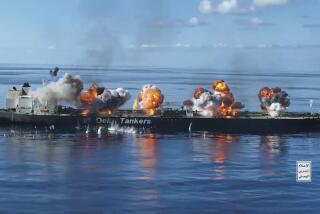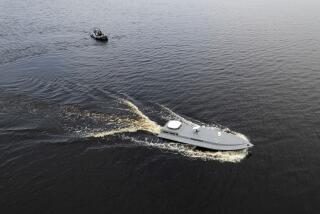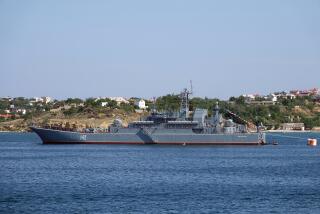Somalia pirates deny mutiny report
- Share via
NAIROBI, KENYA — Pirates who seized a weapons-laden Ukrainian cargo ship off Somalia did not engage in a shootout that left three of them dead, as was claimed by Kenyan maritime officials, a representative for the group said Tuesday.
There has been no dissension aboard the ship, said Sugale Ali Omar, who identified himself as a spokesman for the pirates and claimed to be aboard the hijacked vessel.
“There was no shooting and there is no fighting among us,” Omar said in a telephone interview.
He also said the pirates had no plans to sell any of the 33 tanks or other weaponry aboard the ship as long as they received $20 million in ransom, which he likened to a tax on foreigners using Somalia’s waters.
The Ukrainian vessel Faina was hijacked last week. It was carrying Soviet-designed T-72 tanks and other weapons reportedly purchased by the government of Kenya.
Many experts think the final destination of the tanks is the government of southern Sudan.
About 50 pirates are thought to be on the ship, with more in the area for support.
Omar said the pirates were acting alone and not on behalf of any of Somalia’s warlords or Islamic groups, including those waging war against Somalia’s fragile transitional government. Some Somali government officials have linked the pirates to Al Shabab, an Al Qaeda-affiliated insurgency group.
“We are an independent group,” Omar said. “We are acting as Somali marines until we get a government that can control Somalia’s waters.”
A Kenyan maritime official suggested that three pirates had been shot late Monday during an internal squabble over whether they should surrender.
A U.S. destroyer and other ships have surrounded the hijacked boat and a Russian frigate is en route, raising fears that a confrontation may be imminent.
Officials for the U.S. Navy, which is monitoring the standoff from about a mile away as ransom negotiations continue, said they had no indication there had been gunfire.
“We are not aware of anything like that,” said Lt. Nathan Christensen, spokesman for the U.S. Navy’s Bahrain-based 5th Fleet. “It’s been very minimal topside. It appears to be rather quiet.”
Somalia has lacked a functioning central government since the collapse of the Mohamed Siad Barre regime in 1991.
Omar said the hijackings were a justified response to what he called foreign exploitation of Somalia’s waters for the last 17 years.
“This is not a ransom,” he said. “It is more like a tax. We are protecting our waters from pirates who illegally fish our seas and dump toxins, like uranium.”
He said his group was prepared to destroy the ship’s cargo and die along with the 20 crew members they were holding hostage in the event that U.S. or Russian commandos attempted to storm the boat.
But Omar said they had no plans to sell the weapons to any of Somalia’s armed groups.
“We understand our country,” he said. “We don’t want to add more weapons into our land.”
--
Special correspondent Lutfi Sheriff Mohammed in Mogadishu contributed to this report.
More to Read
Sign up for Essential California
The most important California stories and recommendations in your inbox every morning.
You may occasionally receive promotional content from the Los Angeles Times.










